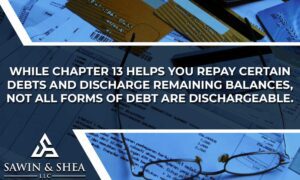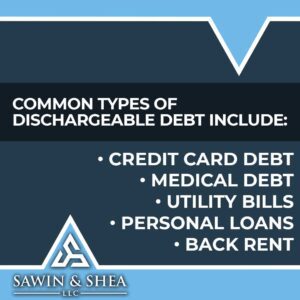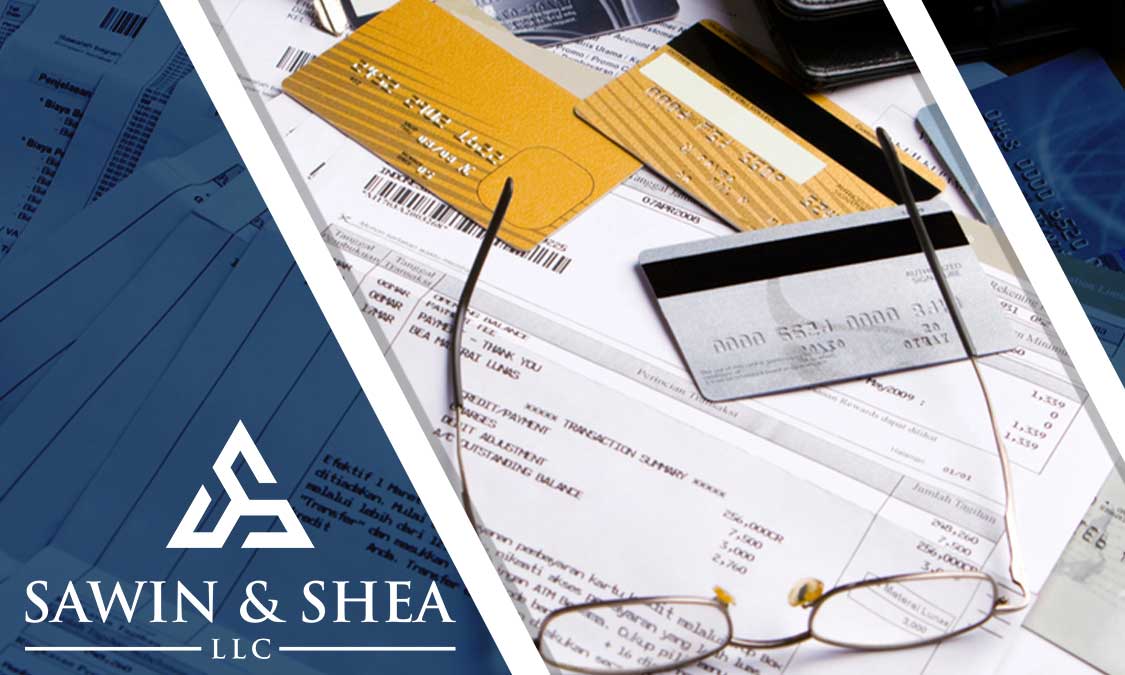Chapter 13 bankruptcy is an invaluable financial tool for those struggling with overwhelming debt, and it can pave the way for a fresh start. Unlike Chapter 7, Chapter 13 bankruptcy allows you to avoid liquidating your non-exempt assets. Instead, you pay a repayment plan over three to five years.
While Chapter 13 is effective for debt relief, many worry about how this filing method may negatively affect their credit scores. Some even have the misconception that their bankruptcy filing will eliminate their credit entirely.
Fortunately, the impact of Chapter 13 isn’t nearly that dire, but it often does, initially, have a negative impact on credit reports. In this blog, we’ll discuss how Chapter 13 usually affects credit scores, and we’ll give you actionable tips to begin rebuilding your credit.
If you have additional questions regarding Chapter 13 or Chapter 7 bankruptcy, contact the attorneys at Sawin & Shea, LLC. We have years of experience assisting Indiana residents with the bankruptcy process, and we offer FREE consultations.
What Is a Chapter 13 Bankruptcy Filing?
Chapter 13 is a personal form of bankruptcy, as opposed to Chapter 11 “reorganization” bankruptcy, which is generally used for businesses and other entities. While different from Chapter 11, Chapter 13 is similar in the sense that it involves reorganizing and consolidating debts.
This filing method is referred to as “the wage earner’s plan” because filers repay some of their debt balances with their regular income. Rather than paying off all of their financial obligations at once, those who file Chapter 13 pay into a plan over a three-to-five-year period.
You first initiate the Chapter 13 bankruptcy legal process by filing a petition in court. The court will then order a bankruptcy stay — also called an automatic stay — that prohibits creditors and lenders from collecting what you owe.
After you file, you create a repayment plan based on your income and assets. This plan states that you’re committed to paying back something to creditors in monthly installments, and you detail the minimum amount you’ll pay as well as the duration of the plan.
Chapter 13 Bankruptcy Discharge
Once you complete paying off your repayment plan over three to five years, the court will discharge your eligible debts.
Common types of dischargeable debt include:

- Credit card debt
- Medical debt
- Judgements
- Utility bills
- Back rent
- Personal loans
- Repossession balances
While Chapter 13 helps you repay certain debts and discharge remaining balances, not all forms of debt are dischargeable.
You will not be able to discharge:
- Family and child support
- Most student loans
- Most local, state, and federal taxes
How Does Filing Bankruptcy Impact Your Standing with Credit Bureaus?
Those considering filing for Chapter 13 have likely suffered from exorbitant amounts of debt from credit cards, medical bills, or personal loans. After all, if you don’t have debt, why would you be interested in filing bankruptcy in the first place?
Overwhelming debt can impair your credit reports from the major credit bureaus — Equifax, Experian, and TransUnion. This is especially the case if you’re behind on your credit payments.
Fortunately, if you already suffer from a poor credit score, your bankruptcy filing will likely not seriously impact your score. It could even improve your credit score.

On the other hand, those who have good credit scores may see their scores shrink when filing, and this risk increases with a greater score. For instance, someone with a 500 FICO score. will likely not suffer from a notably reduced score, but someone with a FICO score of 750 certainly will.
Fortunately, you can rebuild your credit score after you file for Chapter 13.
Do Creditors Prefer Chapter 13 Bankruptcy?
While Chapter 13 can negatively affect your credit report, lenders and creditors usually favor those who filed Chapter 13 compared to those who filed Chapter 7 bankruptcy.
The reason why creditors prefer you file Chapter 13 is because Chapter 7 bankruptcy discharges unsecured debts after the trustee liquidates nonexempt assets. This means that unsecured creditors, such as credit card companies, won’t receive what the debtor owes. Instead, the creditors will consider the unpaid balances as charge-offs, meaning losses.
With Chapter 13, you usually repay at least a portion of your unsecured debts through your three-to-five-year repayment plan. Your prospective creditors have a higher regard for those who file this method because it’s more likely that you’ll repay your debts going forward. Chapter 13 shows that you’re more likely to use your credit responsibly and pay back your debts to creditors.
That said, Chapter 13 is not for everyone, and some of those struggling with overwhelming consumer debt should instead consider Chapter 7 bankruptcy.
How Long Will Chapter 13 or Chapter 7 Bankruptcy Remain On My Credit Report?

Many of those considering bankruptcy worry about how long the filing will remain on their credit reports. The duration you can expect will depend on whether you file for Chapter 13 or Chapter 7.
Chapter 7 bankruptcy remains on your credit report for up to ten years and you cannot file another Chapter 7 for eight years after discharge. Chapter 13, on the other hand, will remain on your credit report for up to seven years after you file bankruptcy.
One critical note is that the seven years begins on your filing date and includes the period in which you make regular payments. This means that you can expect this negative information to be wiped from your credit report two to four years after your Chapter 13 bankruptcy discharge. If it takes you three years to pay off your plan, the bankruptcy will remain on your credit report and affect your FICO score for up to four years. If it takes you five years, the bankruptcy will remain for up to two years after the discharge.
Additionally, if you pay off your plan within one or two years, the bankruptcy will remain on your credit report for a total of seven years.
Can I Take on New Credit During My Chapter 13 Bankruptcy Filing?
Typically, you’re not allowed to secure new credit after you’ve filed bankruptcy. You’ll need to first finish your repayment plan. The reason why is that taking on new debt suggests to the bankruptcy court that you may be unable to maintain your plan for the full period. If you can’t fulfill your financial obligations per your bankruptcy petition, the court will dismiss your bankruptcy case, meaning you won’t be able to discharge your remaining debts.
There are some situations in which you will need to incur additional debt while going through the bankruptcy procedure, such as unexpected vehicle or home repairs. In these cases, it’s critical to consult with a Chapter 13 bankruptcy attorney to assist you. A bankruptcy lawyer can help you find a creditor who’s willing to work with you, and they’ll file a motion to receive permission from the court and the bankruptcy trustee.
Rebuilding Your Credit Score After Chapter 13
After your discharge, the three main credit bureaus will send you copies of your credit report. With this information in hand, it’s time to rebuild and repair your credit score.
Unfortunately, you’ll likely need to pay higher credit interest rates for a few years after your filing, but once you strengthen your credit report, you’ll be able to secure lower rates. Here are some effective ways to improve your credit score moving forward.
Avoid Accumulating Too Much Debt
Wiping your unsecured debts clean doesn’t mean you should return to old habits. It’s best to refrain from taking on too much debt in the first few years following your discharge. This is especially important while your interest rates remain high. Accumulating too much debt may escalate to high credit utilization and challenging credit card balances.
Obtain a Secured Credit Card
You may struggle to find creditors who are willing to lend to you while you repair your credit score. Fortunately, you can obtain a secured card that includes collateral. Credit card companies often feature secured cards for people with little to no credit history or poor credit. You’ll need to pay a minimum fee — usually around $200 — that will serve as collateral, but credit card companies often repay these fees once debtors remain in good standing for an extended period.
Another great option is a credit builder loan, which is intended to help those with poor credit or limited credit histories. While larger lenders usually don’t offer these loans, you may be able to find one through a community bank or credit union.
Make On-Time Payments
Opening up a new line of credit is essential for repairing your credit score, but you need to ensure that you always make on-time payments. Otherwise, you’ll receive negative marks on your credit report. Consider setting regular reminders to make on-time payments or enroll in autopay.
Add a Co-Signer To a Loan
If your recent bankruptcy is making it challenging to secure a loan, such as an auto loan, consider adding a co-signer. Having someone else co-sign will increase your likelihood of receiving approval on a loan or a new line of credit with a lower interest rate.
Further, you can add an authorized user to your credit card account to accelerate the process of strengthening your credit report. One critical note is that you should only add a user if you trust them. If they rack up a high balance and make late payments, they may actually hurt your credit report.
Become an Authorized User
In addition to adding someone to your credit card account, another person can add you to their account. That way, their on-time payments will appear on your credit report. Only become a user on someone else’s card if they make on-time payments and keep their balances relatively low. Otherwise, their credit usage could negatively affect both of your credit reports.
Maintain Healthy Credit Utilization
While it’s important to use credit cards, loans, and other financial instruments to raise your credit score, you need to ensure your credit utilization rate remains below 30%. Your credit utilization rate refers to the sum of your balances compared to your total available credit. For instance, if you have a total of $40,000 worth of credit and owe credit card companies $10,000, your credit utilization rate is 25%.
Contact a Chapter 13 Bankruptcy Attorney Today
Bankruptcy laws are complicated, and it’s essential to ensure you file correctly.
Fortunately, you don’t need to go through your bankruptcy case alone — you can contact the seasoned Chapter 13 bankruptcy lawyers at Sawin & Shea, LLC by calling us at 317-759-1483. In addition to helping you file bankruptcy, we’ll provide financial guidance so you can begin restoring your finances and improving your credit score.



